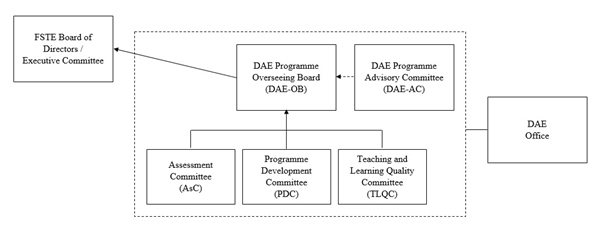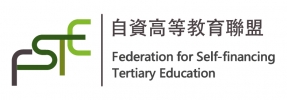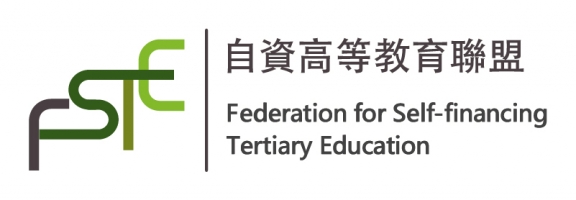
DAE Programme Overseeing Board (OB)
Terms of Reference
1. To manage and ensure the smooth operation of the Diploma of Applied Education Programme and oversee its quality assurance
2. To set and review academic rules and regulations, and QA policies, rules and guidelines, and mechanisms and processes for thorough implementation across various DAE provider institutions
3. To set out, approve and review the terms of engagement, authority and responsibility, and budget of respective committee(s), where appropriate
4. To approve QA documents and action plans for implementation as recommended by the Programme Development Committee
5. To approve the documents for external programme review and re-accreditation and related follow-up reports as recommended by the Programme Development Committee
6. To receive recommendations on new and revised elective proposals from Programme Development Committee and endorse the proposals, if needed, for the accreditation exercise by the HKCAAVQ
7. To work and negotiate, on behalf of FSTE, with the Education Bureau (EDB) and other external bodies on matters relating to the Programme
8. To co-opt members considered appropriate as members of the Committee, if necessary
9. To promote the Programme to employers, educational institutions, and the general public
10. To recommend on the direction of continuing professional development, when appropriate
11. To deliberate annual programme performance reports and action plans to the BoD for information and update, and make recommendations for the way forward, when appropriate
Composition
Chaired by Prof. CHAN Cheuk Hay
DAE Programme Advisory Committee (AC)
Terms of Reference
1. To advise the Overseeing Board on the overall direction of DAE development, delivery, and monitoring.
2. To make recommendations on the forward plan to meet and fulfil the market needs and trend.
3. To recommend measures to enhance the social effectiveness of DAE and its recognition as a qualification that is comparable to HKDSE Level 2 in five subjects for the purposes of work and further study.
4. To receive and review annual consolidated reports from provider institutions and other relevant reports to identify issues for further discussion and consideration by stakeholders.
Composition
Chaired by Dr. Stella KWAN
Assessment Committee (AsC)
Terms of Reference
1. To monitor and maintain the quality standard of the Programme with respect to student assessment and propose measures for quality assurance and enhancement.
2. To set the assessment policies, strategies and guidelines to systematically evaluate students’ performances in achieving the learning outcomes across various courses offered by provider institutions.
3. To set the guidelines and procedures for exam paper and grade moderations for core courses, complementary courses as well as elective clusters offered by individual institutions to ensure the assessment standard and grading consistency.
4. To work collaboratively with Programme Development Committee to set the guidelines on the roles and responsibilities of Course Advisors for core and complementary courses, and to appoint external experts as Course Advisors of the respective courses, as appropriate.
5. To receive reports from Course Advisors (on the moderation of assessment papers and student assessment scores) and approve student assessment results.
6. To report to the OB regarding the outcomes of student assessment.
Composition
Chaired by Dr. Shirley CHOW
Programme Development Committee (PDC)
Terms of Reference
1. To devise procedures and guidelines to facilitate the thorough planning, development and revision of the core and complementary courses of the DAE Programme, including both annual maintenance and periodic holistic review.
2. To work collaboratively with Assessment Committee to set the guidelines on the roles and responsibilities of Course Advisors for core and complementary courses and appoint external experts as Course Advisors of the respective courses, as appropriate.
3. To set the guidelines on the roles and responsibilities, and appoint the Elective Vetting Team and Course Enhancement Teams as appropriate.
4. To vet and approve new and revised elective clusters and recommend to OB for endorsement prior to the external programme review or re-accreditation.
5. To prepare documents for external programme review and re-accreditation for approval by OB.
6. To receive data and findings from course evaluation, graduate survey, teachers’ survey to inform the effectiveness of the programme and respective courses, and to apprise the appropriate adjustment and modification of courses required.
7. To report to the OB regarding the outcomes of vetting of new/revamped elective clusters.
Composition
Chaired by Mr. WONG Chi Kin
Teaching and Learning Quality Committee (TLQC)
Terms of Reference
1. To monitor and maintain the quality standard of the Programme.
2. To formulate the teaching and learning strategies and approaches and related pedagogical development priorities to promote the teaching and learning effectiveness and quality learning experiences of students.
3. To plan and design the orientation and training programmes for new full-time and part-time teachers to equip them with the general background and teaching approaches to address students’ learning needs and facilitate their learning.
4. To plan and design programmes and activities to promote and support the ongoing professional developments for in-service teachers.
5. To explore ways to recognise outstanding teachers and promote the sharing of good practices across institutions.
6. To collect and analyze the QA data from course evaluation, graduate survey and teachers’ survey to monitor the quality of programme delivery and to inform QA as well as areas and actions for possible quality enhancement.
7. To review follow-up actions taken by provider institutions in response to findings from course evaluation and significant cases of complaints.
Composition
Chaired by Dr. Raymond NG








